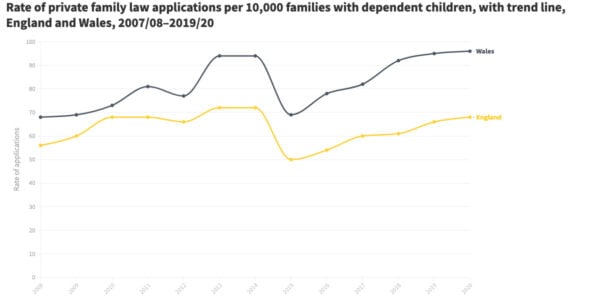Private law: Separating families and private law proceedings
How can we better understand the families coming to court following separation?
Menu
Children are far more likely to be involved in private law disagreements between their parents than they are likely to be subject to child protection proceedings – but we know little about the lives or experiences of these children and their families. We are working to better understand why they are coming to court and how their needs can be better met.
Why do we need research into private law?
When families are unable to agree on the care or upbringing of children, they can apply to the family court. These are known as private law cases and usually involve separated parents making arrangements for their children.
More than twice as many private law applications are started in England and Wales each year than public law applications. Yet little is known about the children and families appearing in the system, their background or particular issues, or the services available to them on their journey towards the courtroom.
Those within the family justice system express concerns about rising cases numbers, difficulties in parents accessing legal advice, the ability to respond to issues such as domestic abuse, the impact of protracted cases on children’s welfare, litigation over ‘trivial’ issues, and a lack of children’s participation throughout the process.
Historically there has been a significant lack of evidence about these families. In recent years progress has been made but many evidence gaps remain.
What we are doing
- Our research is providing new data and evidence on the children and families entering private law proceedings in England and Wales. Initial work, produced by the Family Justice Data Partnership, uncovered a link to deprivation and significant variations in the volumes of applications across England.
- To add to our understanding of those making private law applications, the Family Justice Data Partnership team linked data with hospital and GP records in Wales revealing that adults involved in private law proceedings have a range of increased health vulnerabilities, including higher levels of healthcare use and rates of severe mental health diagnoses, than similar adults in the general population.
- We looked at UK and international research studies from the last 20 years that directly obtained children’s and young people’s thoughts on parental separation and/or their experience of court proceedings have been distilled into six key findings.
- We also produced a study on what the data tells us about the ways in which children participate and how often. We followed up on this with a report on how often we hear the voice of the child in proceedings.
- Looking beyond the data, our qualitative research by the University of Bristol provides evidence from parents and children about their experiences when the parents separated. Following this we offered insights into what parents and children found valuable when managing and adjusting to the separation, as well as their reasons for using, or deciding not to use, the family courts.
- After our earlier study found that 1 in 10 private law cases involves adults other than parents, we published further analysis that helped us understand much more about those involved in these applications. The study, again undertaken by the Family Justice Data Partnership, revealed a potentially significant overlap with public law cases dealing with similar family circumstances.
- We have published a Spotlight paper highlighting what we know about adults in private law proceedings, focusing on the evidence available about different vulnerabilities.
- We are working with partners to improve how children are heard within court proceedings and how they are helped to participate in ways that uphold their legal rights and promote their welfare. We have created training opportunities focused on the voice of the child for practitioners as they launched the Private Law Pathfinder Courts launched.
Explore our research on private law
Type

Infographic
What do we know about children in the family justice system?
Our infographic pulls together what we know, and what we don’t know, about children’s journeys through the family justice system from national data.






